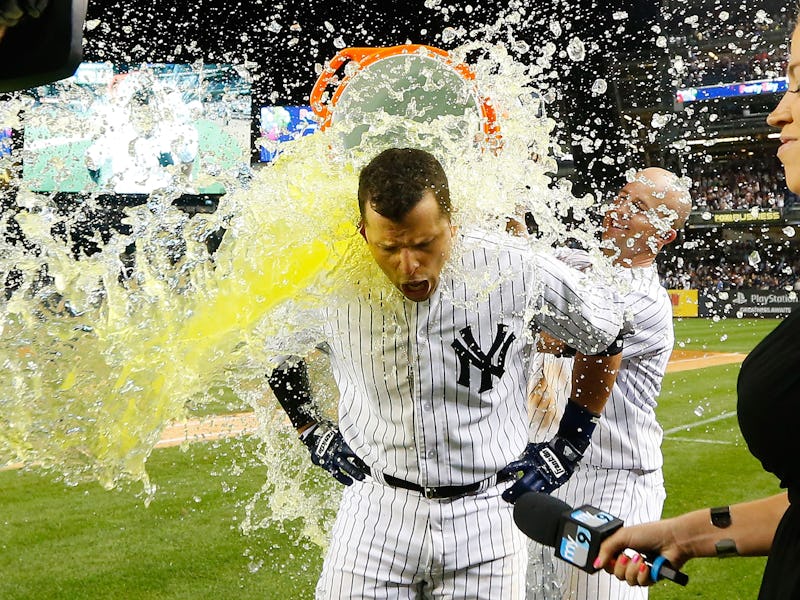Engineering the Perfect After-Sex Sports Drink
It's a complicated question because hydration is a small part of the problem.

Regardless of how much effort actually goes into it, sex feels like a workout. This is not because sex is actually physically taxing: For an average-sized guy, sex only burns — brace yourselves — a paltry 21 calories per average six-minute session according to a 2013 study in the New England Journal of Medicine. When it comes to stamina and turn around time, electrolytes aren’t the problem. Hormones are. Could you create a sports drink to help fight that urge to fall asleep? Yes, and it wouldn’t just be coffee.
That pleasant feeling washing over you post-orgasm is the result of a flood of neurotransmitters and hormones, some of which make you feel good, and some of which just put you to sleep. Here’s what would be needed to create a sort of Gatorade for lovers.
Prolactin inhibitor
Prolactin is a hormone released during ejaculation that’s linked to feelings of sexual satisfaction and recovery time. Essentially, it’s a return to baseline horniness, which, post-coitus, is relatively low — low enough, at least, to put a man to sleep.
A 2002 case study of a multi-orgasmic man in the International Journal of Impotence Research found that he didn’t experience the usual surge in prolactin after ejaculation, suggesting that decreasing prolactin levels could cut recovery time.
Unfortunately, the average non-multi-orgasmic dude releases normal amounts of prolactin during orgasm. Inhibiting its effects is tricky and we didn’t want to get into pharmaceutical territory, so it’s a good thing dopamine, which is also released during sex, is known to inhibit its effects. The important thing here is to amp up the dopamine.
L-tyrosine
The “pleasure hormone,” dopamine, has been called an “orgasm accelerator” and has long been linked to stimulating reward systems in drug use.
Dopamine and prolactin levels even each other during orgasm, but would increasing dopamine’s effects feel good and counteract prolactin’s recovery time-lengthening effects? In theory, yes. Adding L-tyrosine — a dopamine precursor that some people use to stave off MDMA comedowns — to the mix could help stimulate its production in the brain. So time to add some chocolate.
Gingko, ginseng, and B12
The desire to cuddle is often chalked up to oxytocin, the “love hormone.” It’s not a bad thing, but because it’s also linked to stress release, it’s also thought to lead to relaxation and sleepiness.
Caffeine, though the most obvious choice for a bit of stimulation, might give you the shakes, vibration of the full-body variety is not nearly as sexy. Natural energy boosters are the way to go here.
Nicotine
There’s surprisingly little research on why the post-coital cigarette is a thing. Smoking is known to trigger a small rush of adrenaline as well as stimulate dopamine-related pleasure and motivated pathways in the brain, so it makes sense. We’re keeping this one optional — long-term smokers eventually have trouble getting it up. Addiction can be unhealthy, but in this particular case the addition of a stimulant might not be the worst idea.
Calories
We threw in 21 calories of sugar — about two gummi bears’ worth — for those of you who really think you deserve it.
Artificial Coloring
Red. Obviously.
The long and the short of it: Yes, a post-coital liquid pick-me-up is possible. What it is isn’t easy to make or particularly romantic. But romance isn’t always the point. There’s always an athlete out there focusing on peak performance.